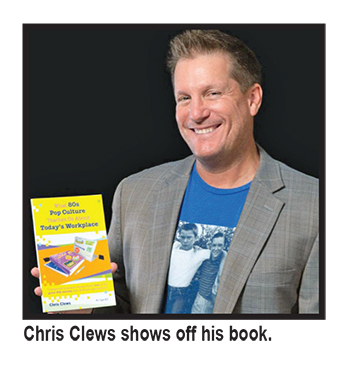 An interview with author Chris Clews
An interview with author Chris Clews
By Rachel Galvin
“Your career will be a journey. Enjoy the ride,” said Deerfield Beach author Chris Clews in his book What 80s Pop Culture Teaches Us About Today’s Workplace. With witty anecdotes, Clews takes his readers on a nostalgic trip back to the simpler time of the 1980s. He tells lessons that can be learned from 10 great movies from the time period, including gems like The Goonies, Back to the Future and E.T. Chevy Chase’s Christmas Vacation becomes a great example of why it is important to “know your audience,” when his ranting in front of Cousin Eddie leads a bad situation to go to worse. Stand By Me shows that teams work best when each person’s individuality is embraced. Ferris Bueller reminds people of the importance of stopping to smell the roses so Clews says it is important to take a day off from work and enjoy life. These are just a few examples in this book, which is a quick read. For fans of the ‘80s, this book is a treasure.
Asked why he decided to write the book, Clews said, “I was actually in a job that wasn’t fulfilling and I was pondering my future when the classic ‘80s movie, The Breakfast Club came on TV. Judd Nelson’s character says, ‘Screws fall out all the time. The world is an imperfect place.’ Something just clicked in my head at that moment and I thought, ‘Yeah, it actually is and so is the business world.’ And that was my springboard. I wrote an article that evening to post on LinkedIn titled ‘What The Breakfast Club Teaches Us About Today’s Workplace’ and, to my surprise, I received reactions from all over the world. So I wrote another on ‘What Ferris Bueller Taught Us About Today’s Workplace,’ which was also received well. At that point, I decided it might make sense to write a book.”
He recruited his friend Jim Zielinski to do the illustrations for the book and self-published it on Amazon.
When asked what he finds so inspiring about this “Me Decade,” he said, “The ‘80s seems to really transcend generations. I’ve met people who clearly didn’t grow up in the ‘80s but can quote the movies, know the songs and feel more of a connection to that decade then the one that provided them with their formative years. Shows like Stranger Things, The Goldbergs and The Americans have brought the ‘80s back to prominence and, of course, Adam Sandler movies are always good for a plethora of ‘80s references. Recent movies like Ready Player One, the Guardians of the Galaxy series and Deadpool all bow at the altar of 80s pop culture with references weaved in throughout.”
He added, “As far as the movies, it was really the last decade where you really had to tell a story and develop characters. You couldn’t lean on CGI (computer-generated imagery) special effects to make up for a thin plot line, lack of strong characters or poor dialogue. The story and the characters were the movie. The special effects were not. And, save for a few, I think movies are missing that today. Of course, there will never be another John Hughes so I guess we ‘80s kids were very lucky indeed.”
He added that the pop culture of the decade went beyond just movies, but included TV, music, video games, toys and fashion.
“It was a magical time for creativity, invention and, most importantly, the rise of the individual. And, ultimately, we learned a very valuable lesson from The Breakfast Club when Andrew, the jock played by Emilio Estevez, said, ‘We’re all pretty bizarre. Some of us are just better at hiding it, that’s all.’”
Besides being an author, Clews is the Head of Marketing for a software division within a large global brand. He also speaks about topics from his book at events and conferences. In addition, he is working on a second book in the series with 10 more 80s movies and their workplace lessons. For those wanting more information or to book him as a speaker, he can be contacted at cclews1@gmail.com, visit chrisclews.com, or find him on Facebook, LinkedIn under his name, or on Twitter @80spopculture. Find his book on Amazon.com.






